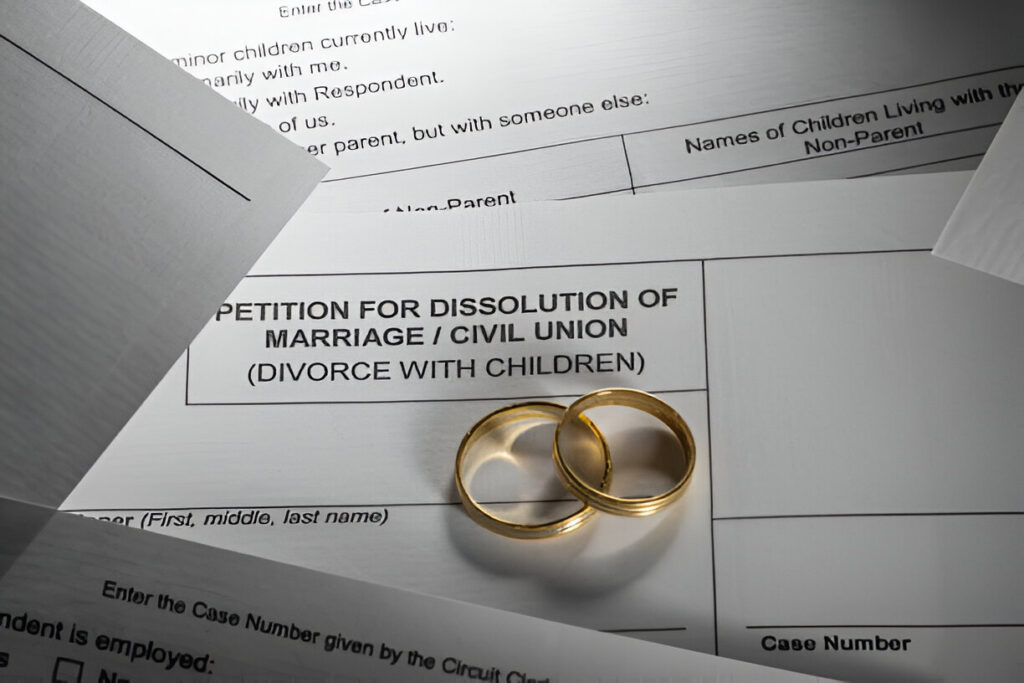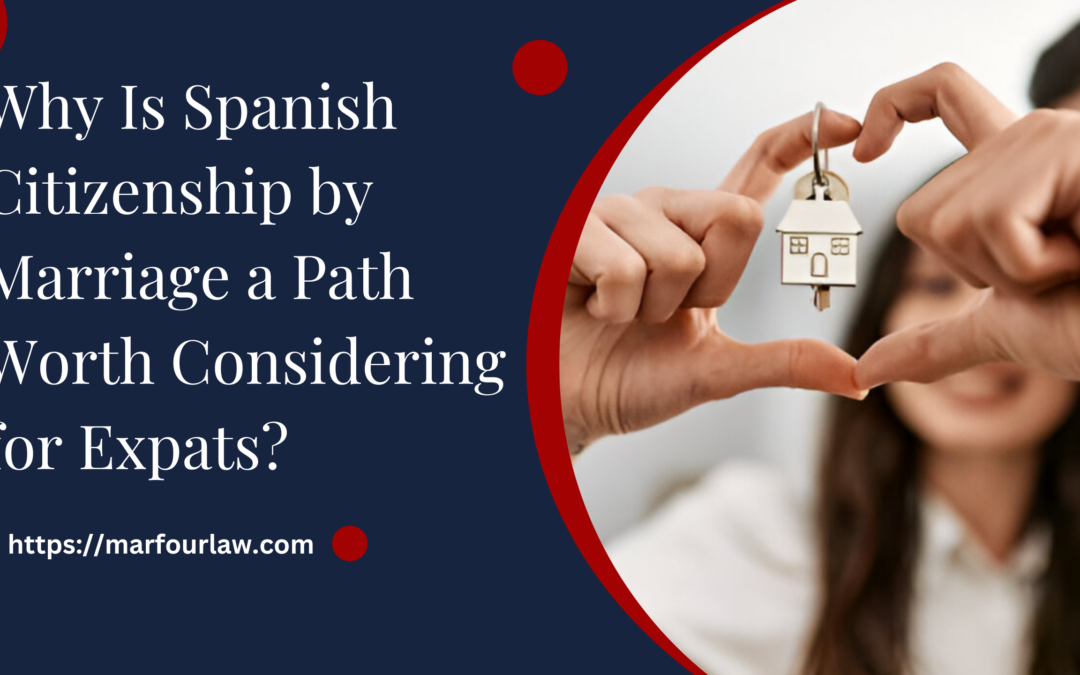Spanish Citizenship by Marriage is an attractive option for those looking to make Spain their permanent home. If you’ve fallen in love with both a person and the vibrant Spanish culture, you might wonder if tying the knot with a Spanish citizen can fast-track your citizenship journey. Well, the good news is that it can. This blog explores the process, requirements, and common questions surrounding obtaining Spanish citizenship through marriage. Whether you’re already married to a Spaniard or planning a wedding (how do you say wedding in Spanish? It’s “boda!”), this guide will walk you through what you need to know.
What Is Spanish Citizenship by Marriage?
If you’re thinking about becoming a Spanish citizen by marrying a Spaniard, it’s not an instant process. Even though marriage is a key part of the journey, it involves more than just saying “I do.” Living in Spain and fulfilling some legal requirements are also necessary steps along the way.
Living Requirement After Marrying a Spanish Citizen
After you marry a Spanish citizen, you’ll need to live in Spain for at least one year before applying for citizenship. This isn’t just a simple formality—it’s part of Spain’s naturalization process. You must hold legal residency during this time, meaning your visa and other documentation should be in order.
Legal Residency and the Necessary Paperwork
To apply for citizenship, being legally married isn’t enough. You’ll also need to ensure your residency status is official and up-to-date. This involves gathering documents like a residency card, marriage certificate, and criminal background check from your home country and Spain. The paperwork may seem tedious, but moving your application forward is essential.
Proving Strong Connection to Spain
Citizenship by marriage isn’t just about a legal union. You’ll also need to show that you have integrated into Spanish society. This could include demonstrating your understanding of Spanish culture, language, and traditions. A basic Spanish language knowledge is often expected, and passing a language test might be required, depending on your situation.
The Application Process for Spanish Citizenship
You can apply for citizenship once you’ve met the residency requirement and gathered all the necessary documents. This involves submitting your application to the Spanish authorities, who will review your case. Be prepared for some waiting time—it’s a lengthy process that can take months or even years, depending on various factors. But in the end, you’ll become a Spanish citizen if all goes well!
Citizenship Requirements Marriage Applicants Must Meet
Getting citizenship through marriage is often seen as a fast track for those married to a citizen of a different country. But it’s not always as simple as saying, “I do.” There are specific requirements and rules that you need to follow, and they can vary depending on the country you’re dealing with. Let’s break down the basics, so you know what to expect.

Length of Marriage Matters
One of the main things countries look at is how long you’ve been married. Most places won’t grant citizenship right after you exchange vows. There’s usually a waiting period, which can range from a couple of years to five years or more. This waiting period helps ensure the marriage is genuine and not just a way to get around the normal immigration process.
For example, in the United States, you must have been married to a U.S. citizen for at least three years before applying for naturalization, provided you’ve been a permanent resident. Other countries, like Spain, may require just one year of marriage, but the couple must live together during this period.
Residency Is Often Required
Being married to a citizen doesn’t automatically mean you can apply for citizenship. Many countries require you to live in that country for a specific amount of time while married. This residency requirement shows that you’re committed to your spouse and the country you’re looking to become a part of.
Countries like the UK and Germany require applicants to live in the country for several years before applying. This means you and your spouse must plan on staying put for a while to meet the requirements.
Proof of Genuine Relationship
Another major requirement is proving that your marriage is legitimate. Governments are aware of “sham marriages,” where people get married to gain citizenship. So, they ask for evidence that the relationship is real. This can include shared bank accounts, joint property ownership, and even photos and messages between you and your spouse.
Interviews with immigration officers are also common. They’ll ask personal questions about your relationship, sometimes even surprising ones, like how you met or your partner’s favorite food. This helps them verify the authenticity of your marriage.
Language and Cultural Knowledge
Some countries may also require you to learn the local language or understand the country’s culture and laws. While this isn’t always a deal-breaker, being able to speak the language shows a commitment to becoming part of the society you’re marrying into.
For instance, Germany requires applicants to pass a language test. This doesn’t mean you have to be fluent, but being able to hold a basic conversation is often necessary. It’s not just about being married; it’s about integrating into the community.
No Criminal Record
Lastly, having a clean legal record is key. Countries usually won’t grant citizenship to someone with a criminal history. Even minor offences can cause issues, so it’s important to ensure your record is spotless before applying. Some countries are stricter than others, so it’s worth checking the specific laws in the country where you’re seeking citizenship.
While marrying a citizen can speed up the path to citizenship, it’s not a free pass. You’ll still need to meet various requirements, from proving your relationship is real to living in the country for a certain amount of time. But with the right preparation and commitment, you and your spouse can start the next chapter of your lives as citizens.
Can You Become a Citizen by Marriage?
Marriage can be a pathway to citizenship in many countries, but the process varies depending on the country’s laws. Let’s break down how citizenship by marriage works and what you need to know if you consider this route.

What Is Citizenship by Marriage?
Citizenship by marriage means that a person can gain citizenship in a country by being legally married to a citizen of that country. It sounds simple, but it’s rarely automatic. Most countries have specific rules and steps to be followed before you can call yourself a citizen. These steps might include proving the authenticity of your marriage, meeting residency requirements, or passing language or civic tests.
Do You Automatically Get Citizenship?
No, marriage doesn’t automatically grant you citizenship. While marrying a citizen may make you eligible for permanent residency or a visa, citizenship usually comes later, if at all. Many countries require foreign spouses to live in the country for several years before they can apply for citizenship. For instance, in the United States, a person married to a U.S. citizen must be a permanent resident for at least three years before applying for citizenship.
What Are the General Requirements?
Every country has its own set of requirements for gaining citizenship through marriage, but some common elements include:
- Residency: You may need to live in the country for several years. In Spain, for example, you must be married for at least one year and live in the country for one year before you can apply.
- Language Proficiency: Many countries require you to speak the local language to a certain level. This ensures that you can integrate into society.
- Proof of a Genuine Marriage: To prevent fraud, most governments want to be sure your marriage is real. This often means providing evidence of cohabitation, shared financial responsibilities, and maybe even an interview.
Are There Challenges?
Yes, the process can be lengthy and complicated. Governments are very cautious about giving out citizenship and want to ensure the marriage is legitimate. Some countries have strict residency requirements, while others may ask for a lot of paperwork. You may also need to show that you can financially support yourself or that you have strong ties to the country.
Is Citizenship by Marriage Right for You?
While it can be a way to gain citizenship, it’s important to know that it’s not always quick or easy. The process may take several years, and you will need to meet various legal requirements. If you’re thinking about pursuing this, it’s a good idea to research the specific laws of the country you’re interested in and perhaps seek legal advice.
How Do You Say a Wedding in Spanish?
If you’re learning Spanish or just planning to attend a wedding in a Spanish-speaking country, you might be curious about how to say “wedding” in Spanish. It’s not just about translation but also understanding a bit of the culture behind the word. Let’s break it down!
The Word for Wedding in Spanish
In Spanish, the word for “wedding” is boda. It’s a simple, four-letter word that carries much weight, just like its English counterpart. Whether you’re attending a grand church ceremony or a laid-back beach celebration, Boda is the word you’ll use when discussing this important life event.
A Little Context on the Word
Just like in English, the word boda doesn’t just refer to the ceremony but the entire event—everything from the vows to the reception party afterwards. When you hear someone say “Voy a una boda” (I’m going to a wedding), they’re talking about the whole day’s experience, not just the moment two people say “I do.” In Spanish-speaking cultures, a wedding is often seen as a huge celebration, sometimes lasting all day and night!
How to Use “Boda” in a Sentence
Now, if you want to talk about weddings in Spanish, it’s helpful to know a few ways to fit boda into a sentence. Here are some examples:
- “La boda fue hermosa” – The wedding was beautiful.
- “Voy a asistir a una boda este fin de semana” – I’m attending a wedding this weekend.
- “¿Cuándo es tu boda?” – When is your wedding?
Related Words You Might Hear
In Spanish, a few other words pop up when talking about weddings. For example, novia means bride, and novio implies groom. If you hear someone mention anillo de boda, they’re talking about a wedding ring. It’s good to know these if you’re diving into wedding-related conversations.
What If the Marriage Ends Before Gaining Citizenship?
Marriage doesn’t always work out, and when it ends before citizenship is granted, it can complicate things. Let’s dive into what typically happens when a marriage ends while you’re still in the process of gaining citizenship through your spouse.

Does Divorce Affect Your Path to Citizenship?
Yes, divorce can affect your path to citizenship. In many countries, being married to a citizen is a key part of your application. If the marriage ends, you might lose your eligibility for citizenship. This is because your original application was based on your relationship, and once that’s no longer valid, your application could be at risk. However, some countries offer exceptions or allow you to continue the process depending on how long you were married or how far along you are in the residency requirements.
Do You Lose Residency Rights?
In most cases, a divorce doesn’t automatically revoke your residency, but it may impact future steps toward citizenship. For instance, if you’re already a permanent resident, you may still be allowed to live in the country, but your path to citizenship might be delayed or even blocked. In the U.S., for example, if you’re married to a citizen and divorce before the three-year residency requirement, you’ll have to wait five years as a regular permanent resident instead of three years.
Can You Continue the Process?
Whether you can continue the citizenship process after a divorce largely depends on the country’s rules. Some countries are stricter, requiring you to remain married throughout the entire process. Others might allow you to continue if you can prove that your marriage was genuine and not just for immigration purposes. In certain cases, if you have children from the marriage or have already built strong ties to the country, you might have a better chance of continuing the citizenship process.
What Happens in Cases of Abuse?
If the marriage ends due to abuse, some countries provide protections for the foreign spouse. In these cases, the spouse may still be able to stay in the country and continue on the path to citizenship. Many governments understand that staying in an abusive marriage just to secure legal status is unfair and unsafe, so they offer legal options to victims of domestic abuse.
Is There Any Way to Avoid Losing Your Chance?
To avoid losing your path to citizenship after a divorce, it’s important to understand the rules of the country where you’re applying. In some cases, applying for permanent residency before your marriage ends may safeguard your legal status. If you’re concerned about how a divorce will impact your immigration status, seeking legal advice early can help you figure out the best path forward.
FAQs
Can you become a citizen by marriage in Spain?
Yes, you can become a Spanish citizen through marriage. However, it’s not automatic. You must be married to a Spanish citizen and reside in Spain for at least one year before applying for citizenship.
What are the citizenship requirements for marriage in Spain?
To apply for Spanish citizenship through marriage, you need a valid marriage certificate, proof that you’ve lived in Spain for at least one year, and documents demonstrating that your marriage is genuine. You may also need to pass an interview and provide your spouse’s citizenship documents.
Do you have to get married in Spain to apply for citizenship through marriage?
No, the marriage doesn’t have to take place in Spain. However, if you marry outside Spain, you must register the marriage with the Spanish Consulate in the country where the wedding occurred.
What happens if you divorce before getting citizenship?
If you divorce before your citizenship application is approved, you may lose eligibility for citizenship through marriage. Spanish authorities require the marriage to be valid and ongoing at the time of application.
Conclusion
Spanish Citizenship by Marriage offers a unique and relatively quick path to becoming a citizen of Spain. While the process requires attention to detail and careful preparation, it can be a rewarding way to solidify your connection to both your spouse and the country. By meeting the residency and documentation requirements, and ensuring your marriage is genuine, you can look forward to enjoying the full benefits of Spanish citizenship. Whether you’re just starting this journey or already on your way, understanding the steps involved will make the process smoother and help you feel more confident as you work toward becoming a Spanish citizen.

